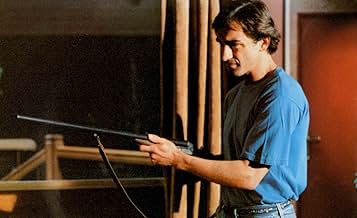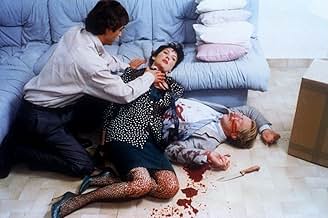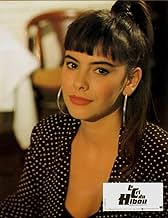IMDb RATING
6.3/10
1.1K
YOUR RATING
After separation from his wife Robert moves to Vichy where he observes beautiful Juliette. Her fiance Patrick becomes jealous and attacks Robert. When Patrick disappears Robert is suspected ... Read allAfter separation from his wife Robert moves to Vichy where he observes beautiful Juliette. Her fiance Patrick becomes jealous and attacks Robert. When Patrick disappears Robert is suspected to have killed him.After separation from his wife Robert moves to Vichy where he observes beautiful Juliette. Her fiance Patrick becomes jealous and attacks Robert. When Patrick disappears Robert is suspected to have killed him.
- Awards
- 1 win & 1 nomination total
Featured reviews
M. Chabrol has done a strong, creditable job of transferring the powerfully discomforting world of Patricia Highsmith to the screen. Highsmith's characters become moral monsters through a condition of absolute confidence in their own warped psyches. These characters never learn, or understand themselves. Their lies to each other are absolute because they lie to themselves absolutely. No cliché goes unpunished. Characters become moral monsters without losing their sense of rightness. They seem powerless not to act in self-destructive ways.
The film is not equal to "Strangers on a Train" or "Purple Noon," other adaptations of Highsmith's work. But it is faithful in spirit to a novel which is itself not equal to the literary sources of these films. See it with an open mind and revel in the creepiness. Chabrol is a sufficiently great artist to allow another great artist her night cry.
The film is not equal to "Strangers on a Train" or "Purple Noon," other adaptations of Highsmith's work. But it is faithful in spirit to a novel which is itself not equal to the literary sources of these films. See it with an open mind and revel in the creepiness. Chabrol is a sufficiently great artist to allow another great artist her night cry.
"Cry Of The Owl" is one of the most obscure mid-1980s Claude Chabrol films, and frankly, not among his best (I prefer his "Masques" from the following year). It is very low-key, and doesn't ignite - to the extent that it ever does - until it's too late. Mathilda May is radiant and gives a touching perforance, but it is a little disconcerting that this story is based on a book written by a woman (the famous Patricia Highsmith), considering the behavior and, especially, the fate of both main female characters. Then again, you could say that the men don't fare much better, either. **1/2 out of 4.
A film described as being "in the Hitchcock tradition" usually means "a cheap imitation", and this French import is no exception. Director Claude Chabrol tries hard to invoke the spirit of the Master by adapting his screenplay from a story by Patricia Highsmith (author of 'Strangers on a Train') about a divorced artist with a fixation about birds (sound familiar?), whose voyeuristic attraction to the unhappily marries Mathilda May leads to a perfectly innocent, platonic friendship between two manic-depressive people. The plot kicks into gear after May's jealous husband disappears; birdman Christophe Malavoy is then accused of foul play, and the film goes to pieces in a hurry, collapsing into a random sampling of routine plot twists before ending in an unfair, inconclusive freeze-frame. It might have been an entertaining whodunit, but unlike his mentor Chabrol takes his scenario far too seriously: you only have to imagine the actors speaking their dialogue in English straight from the subtitles to realize how silly it really is. The film was made in 1987 but until 1991 was never released on this side of the Atlantic, and for good reason.
Patricia Highsmith created one fascinating character in her novel: Nickie, the ex-wife of Robert Forester, here called Veronique. Virginie Thevenet plays her and she is terrific. Seductive, lying, violent and completely fascinating, she is the one thing in the movie that really works. Malavoy acts like a Boy Scout troop leader, May is dull and lifeless and Kalfon is hard to believe as a detective. Only Penot as the beefy handsome coward Soulages manages to rise to Thevenet's level.
Chabrol was known for his cold, passionless thrillers; you went to them out of a sense of duty. Wasn't he after all one of the founding members of the New Wave? See it if it turns up on late night TV, and there's nothing else to watch.
This Chabrol movie seems to be almost forgotten - given the few comments printed here and given the fact that it's unlikely to be mentioned among the maestros masterpieces. Even though it is based on a novel by Patricia Highsmith, and has some degree of tension in it, "Le Cri du Hibou" doesn't really draw the viewer inside the small world of it's handful of characters. Everyone in this film seems to have his private neurosis, and when fate bonds them all together, an explosive mixture is the result. Unfortunately (and unusually for Chabrol) the narration is not clever enough to tantalize the viewer. Instead, quite a bunch of implausible elements make it hard to enjoy the unfolding of the story. Then again, since it is the story of a man regarded as threat by his surrounding without ever wanting to threat anyone, a man seen as guilty without guilt (or is there guilt at his hands?), Chabrol had to avoid all too much realism. An ultra-realistic view at the same story would stop at 40 minutes; it would not be able to display the ideas driving the characters to their deeds like Chabrol does. Seen through this perspective, the film is quite an interesting statement.
Did you know
- TriviaOne of two adaptations of Patricia Highsmith's novel "The Cry of the Owl" that was released the same year, the other adaptation is Der Schrei der Eule (1987).
- ConnectionsVersion of Der Schrei der Eule (1987)
- How long is The Cry of the Owl?Powered by Alexa
Details
Contribute to this page
Suggest an edit or add missing content

































